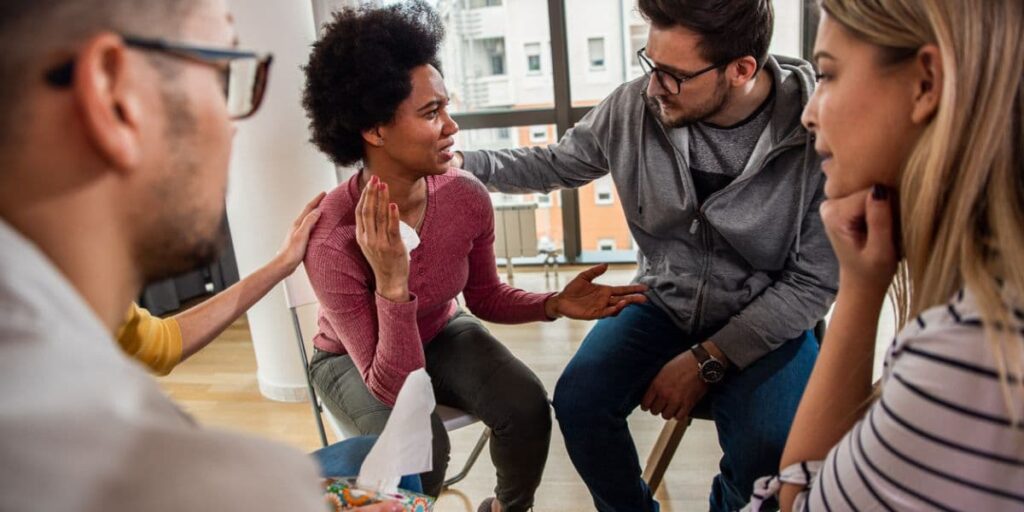What Is Addiction Group Therapy?

In group therapy for substance use disorders, sharing with others helps break down barriers to getting better. It gives a feeling of togetherness and hope. Meeting people who face similar challenges lessens the shame around addiction and creates a supportive environment.
What Is Group Therapy?
Group therapy is when two or more people with similar problems work with a trained helper. During group therapy sessions, people share their experiences, challenges, and different ways of seeing things. This therapy helps people build a support network and improve at talking and relating to others.
Two types of therapy groups exist. A revolving group allows for new people to join at any time and doesn’t always need you to come every time. A fixed therapy group is a small group of people who need to go regularly to make progress together. Fixed groups help people form stronger connections and understanding as they see each other get better.
Sometimes, people mix up addiction group therapy with 12-step programs like Alcoholics Anonymous (AA) and Narcotics Anonymous (NA). These treatment programs are suitable for ongoing support when getting better, but are not the same.
Group Therapy vs. Individual Therapy
Group therapy and individual therapy have key differences, but they often work well together. Here’s what sets them apart:
Confidentiality: The law keeps what you say in individual therapy private. While everyone is expected to keep things private in group therapy, there is no guarantee.
Pace of Healing: Everyone heals at their own pace. Individual therapy lets you spend more time on a single issue. Group therapy often moves at a pace that works for most of the group.
Handling Trauma: Learning about someone’s trauma can be tricky. In a group, even well-meaning members might say the wrong thing. Individual therapy keeps trauma private and involves a trained therapist who knows the right way to respond.
Comfort Levels: Some folks get extremely nervous in groups. Individual therapy can feel safer for them. Group therapy is good for pushing your comfort zone, but it might be too much too soon for some.
Staying at a treatment center has a benefit. Therapists observe your progress in group and individual sessions. They provide valuable feedback for your personal growth and recovery.

What Are the Types of Group Therapy for Addiction Treatment?
In addiction treatment, there are five kinds of group therapy: psychoeducational, skills development, cognitive-behavioral therapy, support, and interpersonal process group therapy.
Psychoeducational Groups
Psychoeducational groups focus on teaching people about substance use disorder and mental health. They explain the link between behaviors and these issues and the potential consequences that can result from them. Group leaders often use videos, reading materials, and guest speakers to help with learning.
Some things psychoeducational groups may focus on include:
- Learning how to take good care of yourself
- Figuring out ways to solve problems and settle disagreements
- Knowing and staying away from things that can cause trouble
- Setting limits with friends and family
Skills Development Groups
Groups for skill development use knowledge from psychoeducational groups to enhance skills for maintaining recovery and personal growth. Recovering may require learning coping skills or relearning old life skills that addiction caused to be lost.
Some of the things skills development groups work on include:
- Ways to prevent going back to old habits
- Coping strategies to deal with tough times
- Life skills, like managing time and money
- How to talk and listen better
Cognitive Behavioral Therapy Groups
Cognitive behavioral therapy (CBT) groups help people find and change behaviors they’ve learned by changing how they think, believe, and react to things. These groups are helpful for newcomers to recovery. They help individuals understand how their thoughts can lead to addiction and old behaviors.
Cognitive behavioral therapy (CBT) groups focus on improving positive thoughts and behaviors like:
- Feeling good about oneself
- Believing in one’s abilities and being independent
- Feeling less alone and less judged
- Managing situations better and preventing going back to old habits
- Learning to control emotions better
Support Groups
Support groups help people feel like they belong and are responsible for their actions. They help practice getting along with others and listening well. Support group members can help by identifying excuses and offering feedback for relapse prevention to avoid getting into old habits.
Support and recovery groups offer things like:
- Making people feel understood and accepted
- Giving support without conditions
- Talking in a way that shows respect
- Sharing stories so people feel less alone

Interpersonal Process Groups
Interpersonal process groups help people understand how their thoughts and feelings impact their relationships with others in the group. This kind of group therapy gives a glimpse into how people act in their relationships outside of treatment. The group leader can also learn about a person’s behaviors and talk about them in one-on-one meetings.
Interpersonal process groups help improve skills like:
- Listening carefully and paying attention
- Talking to others in a respectful way
- Understanding how past events affect what’s happening now
- Telling the difference between what we think and what’s true
If you join one, a few, or all kinds of group therapy for treating substance abuse, it’s important to remember that it’s not about competing or rushing. The goal is to feel understood and accepted as much as it is to understand and accept others.
Benefits of Group Therapy
Group therapy for substance use disorders offers many benefits, and each person will feel them differently. Feeling like you belong and less judged are some of the first good things you’ll notice in group therapy. These help people be more open to the other good things it offers.
Group therapy gives benefits like:
- Encouragement and good peer pressure to stay away from drugs and alcohol
- Hope and inspiration from seeing others get better
- Learning better ways to talk to people and solve problems
- A safe space to practice speaking and social skills again
- Learning how to teach others and get help
- Getting new views and support from the group to feel better about yourself
- Feeling a sense of order and self-control
Some good things from group therapy will show up fast, while others will take time and grow slowly. The skills and stuff you learn in group therapy are good for staying away from addiction for a long time and help in all parts of life.
Addiction Group Therapy at Northridge Addiction Treatment Center
At Northridge Addiction Treatment Center, we believe that treatment facilities must support their patients during every step of recovery. Empowerment and support are important for treating substance abuse disorders effectively.
Having support from others can significantly impact recovery. Being part of a community can provide a sense of belonging and connection. These elements are crucial in helping individuals overcome addiction.
NATC utilizes proven treatments, such as one-on-one therapy and group therapy for addiction. This ensures you get the most out of your time in our residential treatment center. Our licensed and experienced addiction experts are great at creating a safe, supportive, and empowering space for our residents. We want you to feel comfortable in a nurturing, family-like setting.
Get in touch with us today. Our treatment specialists are ready to help with addiction support and start you on a path to meaningful recovery.
Find Meaningful Recovery
Our caring and compassionate specialists are eager to help you comfortably navigate this journey to recovery. Our individualized treatment plan, programs, and therapies may be a perfect match for you or your loved one. Let us assist you in living the happy life you deserve. It starts with a phone call.




